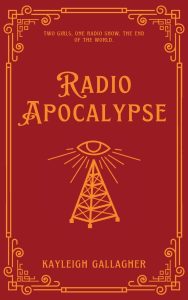Reviewed by Reagan Davison

Seven thousand days into the end of the world brings you to a Radio Apocalypse. Radio Apocalypse takes a spin on sapphic young adult fiction that I have never seen before. The novel speaks more on the lives of orphans, the modern-day life we take for granted, and coming-of-age sapphic love with a black lead. Teen writer Kayleigh Gallagher throws their audience into the daily survivals of Lota and Rachel.
In this post-societal novel, Lota has used her modern-day American radio broadcast as a coping mechanism for being the possible last person on the planet. On this broadcast, Lota talks about her daily life of making content, writing fiction, and analyzing terrifying encounters with what seems to be biblically accurate angels. Speaking to an audience who she doesn’t know responds; the audience being Rachel.
On the other side of the Atlantic lives Rachel, a stressed and purple-haired plant mom who lives alone in her family’s old work facility. Rachel’s life consisted of trying to finish what her most-likely dead parents’ couldn’t, being an up-and-coming harvester, hearing the possibly fake creature in her vents, and drawing in her handmade sketchbook a utopia she may never see. This everyday life of hers takes a turn when she turns on her radio and finally hears a voice; Lota’s voice. Ultimately, both parties are ecstatic about the existence of one another, talking off-air through radio signals every chance they had. After a few weeks of communicating and trying to learn about one another, Rachel now has a new mission on her daily to-do list: Find Lota.
This leads to a very adventurous Rachel and a very worrisome Lota. Rachel heard a voice that “is poetry,” and they don’t want to let it go. As Rachel packs her truck full of the archives of her entire life, Lota continues her broadcasts worried for Rachel and the fact she might have made friends with a not-so-human (more spider-like) creatures named Jeremy and Maya.
Meanwhile, Rachel reaches the most treacherous part of her journey: the Atlantic Ocean. With a very old, marine-biology research boat, Rachel sets off on a trek across the ocean to try and meet Lota, who is sparsely relaying worried messages as a segment of her broadcast. Rachel begins shipping herself across the ocean, but the incoming thunderstorms will not make that easy for her. Will Rachel make it across the ocean? Will Lota and Rachel unite? What are or what used to be the biblically accurate angels? Are there any more survivors on the planet they used to call Earth?
Usually, my book shopping is done in a Barnes and Noble or one of the chain bookstores. So, of course, when I saw Kayleigh Gallagher’s TikToks promoting this book concept a year ago, I was hooked. This year, I’ve been trying to heal my inner child and branch out to more queer writers.
Analyzing and dissecting not just the budding queer love of Rachel and Lota but their journeys was perfectly balanced. I have seen many authors tip the scale and not hit the sweet spot of the balancing of genres, and this is not the case with Gallagher. I was not overwhelmed by the themes of romance, dystopian sci-fi, and suspense. All of the genres were given just enough playtime, and I couldn’t be more ecstatic about that. The science fiction was enough to keep me on my toes, and the puppy love romance was enough to (I will admit) have me kick my feet giddily.
Being able to come in contact with an impressive queer writer and having them write in a sense that these queer characters can be happy in some sense is heartwarming. Being able to see fictional characters work in their own individual lives and not just unhealthy depend on their lover is refreshing. Being able to read about queer characters and have them just be people and not spectacles makes my heart swell.
I have to shout out this addition to the book because it is my favorite. Biblically accurate angels roaming sandy dunes enlightening and frightening our main characters was such a power move. Gallagher’s illustrations of these “angels” bring me to think about an Internet trend. These creatures contradict themselves by being horrifying creatures but telling people “Do not be afraid.” As someone who spends their time on Tiktok, adding this humanoid species was a very good touch and a good giggle.
Overall, Radio Apocalypse speaks of finding survivors in a barren world and the heteronormative pressure that came from a society that once was. Gallagher’s novel tugs at the seams of nostalgia, remembering the prime of dystopian fiction in the early 2010s and remembering the swelling of your heart reading about first love. My inner child heals with concepts of young queer love, making this book one of my favorite reads of this year.
